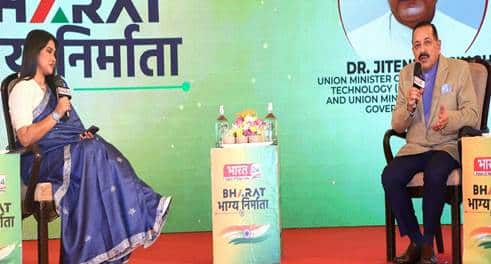Modi Government’s Governance Reforms: Elimination of nearly 2,000 outdated rules

The Modi government has taken significant steps to reform governance in India. One of the most notable changes is the elimination of nearly 2,000 outdated rules. These rules had become irrelevant over time and were hindering efficient operations. Union Minister Dr. Jitendra Singh shared these insights during an event held on the eve of Good Governance Day. This day also commemorates the 100th birth anniversary of former Prime Minister Atal Bihari Vajpayee. Dr. Singh emphasized the government’s commitment to transparency, innovation, and citizen-centric policies. These reforms aim to redefine governance in India, making it more accessible and efficient for the public.
Scrapping Obsolete Rules for Better Governance
The Modi government has made a concerted effort to simplify governance by scrapping outdated regulations. Dr. Jitendra Singh highlighted that nearly 2,000 obsolete rules have been removed. This initiative aims to create a more citizen-friendly environment. The removal of these rules is part of a broader strategy to enhance the ease of doing business in India.
Dr. Singh pointed out that the Department of Personnel and Training (DoPT) took immediate action after Modi assumed office in May 2014. One of the first steps was to abolish a feudalistic rule inherited from the British era. This rule required a gazetted officer to attest documents. By allowing self-attestation, the government sent a strong message of trust to the youth of India. This change has empowered young people, making it easier for them to access opportunities without unnecessary bureaucratic hurdles.
The government has also focused on recruitment processes. In a move towards greater transparency, Prime Minister Modi called for the abolition of interviews for lower-level positions. This decision was implemented in 2016, further streamlining the recruitment process. These reforms reflect a commitment to modernizing governance and making it more efficient.
Cleanliness as a Governance Priority
Another significant aspect of the Modi government’s reforms is the integration of cleanliness into governance. Dr. Jitendra Singh described cleanliness as a hallmark of effective governance practices. The cleanliness drive began with the construction of toilets and has evolved into a national movement. It emphasizes the importance of maintaining clean government spaces and workplaces.
The government has made substantial progress in reclaiming office space and generating revenue through efficient management of scrap materials and obsolete equipment. According to Dr. Singh, the government has reclaimed over 643 lakh square feet of office space, generating ₹2,364 crore for the national exchequer. This transformation has made government offices more organized and efficient, setting a standard for cleanliness and functionality.
The cleanliness initiative is not just about aesthetics; it reflects a broader commitment to improving public services. By prioritizing cleanliness, the government aims to enhance the overall experience for citizens interacting with public institutions. This focus on cleanliness is a testament to the government’s dedication to creating a more efficient and welcoming environment for all.
Transforming the North East: A Model of Development
Dr. Jitendra Singh also discussed the government’s efforts to transform the North East region of India. Under Prime Minister Modi’s leadership, the region has seen significant improvements in infrastructure and socio-economic programs. Dr. Singh described the North East as a “model of development,” highlighting the government’s commitment to enhancing connectivity in the area.
The Prime Minister’s frequent visits to the North East have played a crucial role in this transformation. These visits have not only brought attention to the region’s needs but have also facilitated the implementation of various development projects. Improved connectivity has opened up new opportunities for trade and tourism, benefiting local communities.
The government’s focus on the North East aligns with its broader vision of inclusive development. By investing in infrastructure and connectivity, the Modi government aims to ensure that all regions of India can thrive. This commitment to balanced development is essential for fostering national unity and progress.
Observer Voice is the one stop site for National, International news, Sports, Editor’s Choice, Art/culture contents, Quotes and much more. We also cover historical contents. Historical contents includes World History, Indian History, and what happened today. The website also covers Entertainment across the India and World.

